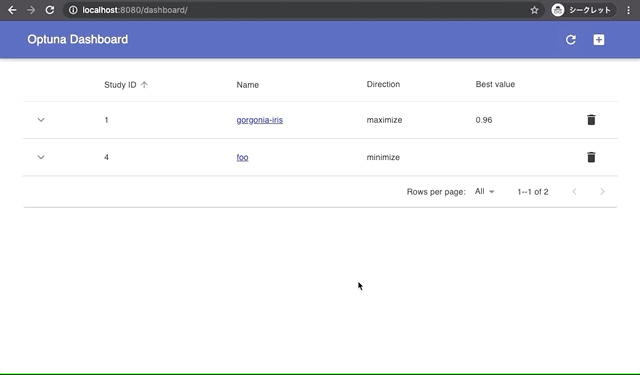evoli
Genetic Algorithm and Particle Swarm Optimization written in Go
Example
Problem
Given f(x,y) = cos(x^2 * y^2) * 1/(x^2 * y^2 + 1)
Find (x,y) such as f(x,y) reaches its maximum
Answer f(0,0) = 1
Particle Swarm Optimization
package main
import (
"fmt"
"math"
"math/rand"
"github.com/khezen/evoli"
)
// 3d cosine that gets smaller as you move away from 0,0
func f(x, y float64) float64 {
d := x*x + y*y
return math.Cos(d) * (1 / (d/10 + 1))
}
type FIndividual struct {
v []float64
x []float64
fitness float64
}
func (i *FIndividual) Equal(other evoli.Individual) bool {
return i == other
}
func (i *FIndividual) Fitness() float64 {
return i.fitness
}
func (i *FIndividual) SetFitness(newFitness float64) {
i.fitness = newFitness
}
type FPositioner struct {
}
func (p *FPositioner) Position(indiv, pBest, gBest evoli.Individual, c1, c2 float64) (evoli.Individual, error) {
fIndiv, ok1 := indiv.(*FIndividual)
fPBest, ok2 := pBest.(*FIndividual)
fGBest, ok3 := gBest.(*FIndividual)
if !ok1 || !ok2 || !ok3 {
return nil, fmt.Errorf("invalid individual type")
}
newIndiv := FIndividual{
v: make([]float64, len(fIndiv.v)),
x: make([]float64, len(fIndiv.v)),
}
w := 0.9
for d := range fIndiv.v {
rp := rand.Float64()
rg := rand.Float64()
newIndiv.v[d] = w*fIndiv.v[d] +
c1*rp*(fPBest.x[d]-fIndiv.x[d]) +
c2*rg*(fGBest.x[d]-fIndiv.x[d])
newIndiv.x[d] = fIndiv.x[d] + newIndiv.v[d]
}
return &newIndiv, nil
}
type FEvaluater struct {
}
func (e *FEvaluater) Evaluate(indiv evoli.Individual) (Fitness float64, err error) {
fIndiv, ok := indiv.(*FIndividual)
if !ok {
return 0, fmt.Errorf("invalid individual type")
}
return f(fIndiv.x[0], fIndiv.x[1]), nil
}
func main() {
pop := evoli.NewPopulation(50)
for i := 0; i < pop.Cap(); i++ {
x := rand.Float64()*20 - 10
y := rand.Float64()*20 - 10
vx := rand.Float64()*20 - 10
vy := rand.Float64()*20 - 10
pop.Add(&FIndividual{
x: []float64{x, y},
v: []float64{vx, vy},
})
}
positioner := &FPositioner{}
evaluator := &FEvaluater{}
sw := evoli.NewSwarm(pop, positioner, .2, .2, evaluator)
for i := 0; i < 100; i++ {
err := sw.Next()
if err != nil {
panic(err)
}
}
// evaluate the latest population
for _, v := range sw.Population().Slice() {
f, err := evaluator.Evaluate(v)
if err != nil {
panic(err)
}
v.SetFitness(f)
}
fmt.Printf("Max Value: %.2f\n", sw.Alpha().Fitness())
}
Max Value: 1.00
Gentic Algorithm
package main
import (
"fmt"
"math"
"math/rand"
"github.com/khezen/evoli"
)
// 3d cosine that gets smaller as you move away from 0,0
func h(x, y float64) float64 {
d := x*x + y*y
return math.Cos(d) * (1 / (d/10 + 1))
}
type HIndividual struct {
v []float64
x []float64
fitness float64
}
func (i *HIndividual) Equal(other evoli.Individual) bool {
return i == other
}
func (i *HIndividual) Fitness() float64 {
return i.fitness
}
func (i *HIndividual) SetFitness(newFitness float64) {
i.fitness = newFitness
}
type HMutater struct {
}
func (m HMutater) Mutate(indiv evoli.Individual) (evoli.Individual, error) {
x := rand.Float64()*20 - 10
y := rand.Float64()*20 - 10
vx := rand.Float64()*20 - 10
vy := rand.Float64()*20 - 10
return &FIndividual{
x: []float64{x, y},
v: []float64{vx, vy},
}, nil
}
type HCrosser struct {
}
func (h HCrosser) Cross(indiv1, indiv2 evoli.Individual) (evoli.Individual, error) {
fIndiv1, _ := indiv1.(*FIndividual)
fIndiv2, _ := indiv2.(*FIndividual)
return &FIndividual{
x: []float64{(fIndiv1.x[0] + fIndiv2.x[0]) / 2, (fIndiv1.x[1] + fIndiv2.x[1]) / 2},
v: []float64{(fIndiv1.v[0] + fIndiv2.v[0]) / 2, (fIndiv1.v[1] + fIndiv2.v[1]) / 2},
}, nil
}
type HEvaluater struct {
}
func (e HEvaluater) Evaluate(indiv evoli.Individual) (Fitness float64, err error) {
fIndiv, ok := indiv.(*FIndividual)
if !ok {
return 0, fmt.Errorf("invalid individual type")
}
return f(fIndiv.x[0], fIndiv.x[1]), nil
}
func main() {
pop := evoli.NewPopulation(50)
for i := 0; i < pop.Cap(); i++ {
x := rand.Float64()*20 - 10
y := rand.Float64()*20 - 10
vx := rand.Float64()*20 - 10
vy := rand.Float64()*20 - 10
pop.Add(&FIndividual{
x: []float64{x, y},
v: []float64{vx, vy},
})
}
crosser := HCrosser{}
mutater := HMutater{}
evaluator := HEvaluater{}
mutationProbability := .02
selecter := evoli.NewTruncationSelecter()
survivorSize := 30
ga := evoli.NewGenetic(pop, selecter, survivorSize, crosser, mutater, mutationProbability, evaluator)
for i := 0; i < 100; i++ {
err := ga.Next()
if err != nil {
panic(err)
}
}
// evaluate the latest population
for _, v := range ga.Population().Slice() {
f, err := evaluator.Evaluate(v)
if err != nil {
panic(err)
}
v.SetFitness(f)
}
fmt.Printf("Max Value: %.2f\n", ga.Alpha().Fitness())
}
Max Value: 1.00
Issues
If you have any problems or questions, please ask for help through a GitHub issue.
Contributions
Help is always welcome! For example, documentation (like the text you are reading now) can always use improvement. There's always code that can be improved. If you ever see something you think should be fixed, you should own it. If you have no idea what to start on, you can browse the issues labeled with help wanted.
As a potential contributor, your changes and ideas are welcome at any hour of the day or night, weekdays, weekends, and holidays. Please do not ever hesitate to ask a question or send a pull request.






